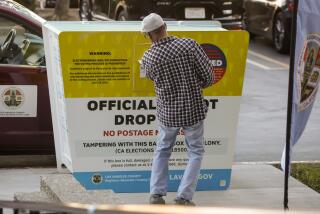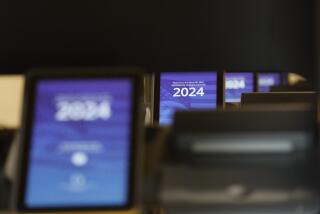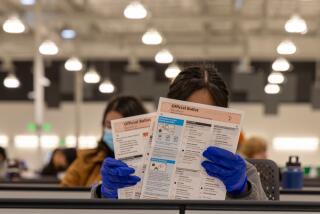Readers React: How low pay and the electoral college make it harder for millennials to vote
To the editor: Veronica Terriquez and Randy Villegas make a strong case about the correlation between young voters’ engagement and turnout. But I feel that more attention must be paid to external factors that prevent young people from voting.
Millennials are more likely that older voters to earn low wages. Many of them work multiple jobs, have positions with unreliable scheduling or are participating in the gig economy. On election day, some are forced to choose between voting and having enough money to pay the bills.
In presidential elections, “battleground” states typically have higher voter turnout. How states are categorized because of the electoral college changes how campaigns operate in those states. If we got rid of the electoral college, young people in “safe” states like California would see more than just candidates showing up to raise money.
Finally, in some states, legal barriers make it harder for young people to vote. There’s also some confusion over the ability of college students to vote in their local elections. Perhaps in California, all incoming freshman at public campuses should be automatically registered wherever their school is located.
Elizabeth Smith, Anaheim
..
To the editor: As a very senior citizen who has never missed a vote, I have watched as turnout has trended downward over the last several decades. Nothing surprises me when I read about the people who fail to vote.
That goes for the lack of involvement by millennials, a generation that has never been asked to sacrifice anything for their country. Why, then, should they be expected to do the one thing required in a true democracy: voting?
David Novis, Santa Barbara
..
To the editor: What researchers Terriquez and Villegas found to be true about 18- to 24-year-old voters mirrors what my colleagues and I discovered in 1975. That’s when we created the California Voter Group, a nonprofit organization designed to encourage high school students to become active voters when they turned 18.
I was particularly struck by one of Terriquez’s and Villegas’ findings: “Unfortunately most schools offer little voter education to students, even though we know that regular voting habits are formed early.” That was true in the 1970s too.
Back then, the California Voter Group discovered that many of the civics texts being used in high school classrooms had been published in the mid-1960s.
Call me a dinosaur, but I believe voting is more than just an American ideal. It is part of the fabric that holds this country together.
Denny Freidenrich, Laguna Beach
Follow the Opinion section on Twitter @latimesopinion and Facebook
More to Read
A cure for the common opinion
Get thought-provoking perspectives with our weekly newsletter.
You may occasionally receive promotional content from the Los Angeles Times.






